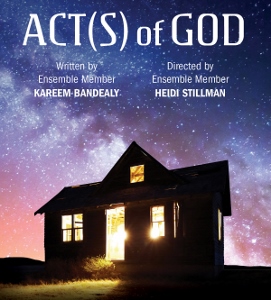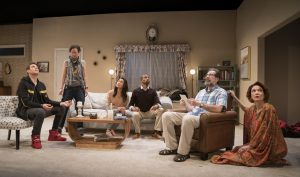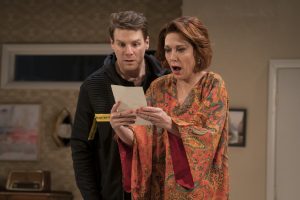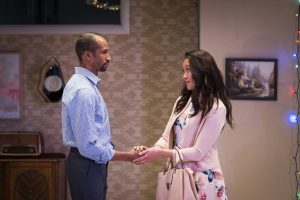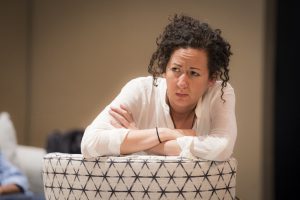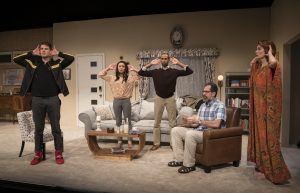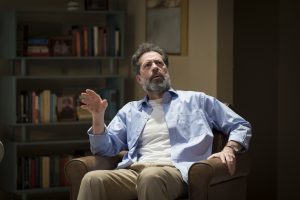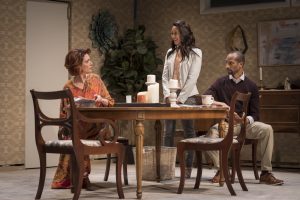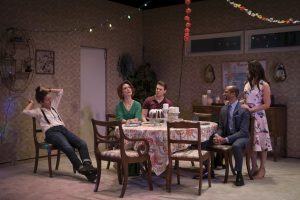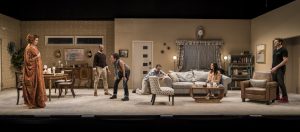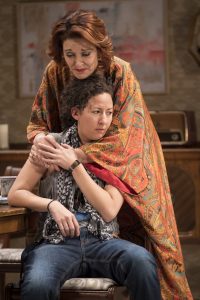TOO MANY ACT(S)
Even apocalypses, it seems, can be goofy, disruptive, and “meta” — if you go by Lookingglass Theatre Company’s irritating and overlong world premiere. With two intermissions that sprawl across 150 not so necessary minutes, this dark offering by ensemble member Kareem Bandealy indulges in some very cute doom. Before it’s over the concoction has forced faith on, then cruelly snatched it away from, six not-so-loved ones, exposing their individual and collective neediness, emptiness, and pointlessness.
Catnip for actors but silly-to-tedious for non-actors, this literally collapsible three-act moral comedy is set in 2029, just as an asteroid last seen in 2004 and named for an Egyptian snake goddess is 19,000 miles away and threatening terrestrial certainties.
As if that’s not enough crisis, trembling with exaggerated excitement, the true-believing Mother (Shannon Cochran) and nap-loving Father (Rom Barkhordar) are joined by their three quarrelsome offspring — feckless, 28-year-old Youngest (Walter Briggs); cheapskate Middle (Anthony Irons), engaged to Fiancee (Emjoy Gavino); and atheistic Eldest (Kristina Valada-Viars) — to greet a special dinner guest. They’ve received a talisman-like invitation that causes, when dropped, power failures in their desert home’s solar cells. Hard to open, the envelope finally reveals that their visitor is no less than God Almighty (appropriately unseen).
Kandealy assiduously reveals how each family member relies on ancient absurdities to arrive at a fittingly self-serving version of the Deity: The smothering Mother, who sings an interminable aria about being unappreciated, imagines God(dess) as a kind of female avenger to atone for her not so great expectations. The non-believer Eldest only sees superstition, a celestial hoax to expose the vacuousness of her clan. The Father, steeped in lore, treats God as an archaeological dig from which he extracts whatever ethics suit his style.
Finally appearing un-Godot-like in the second act, the Master of the Universe turns out to be an incoherent male, farts a lot, stays in the computer room (where there’s no computer), and may well be a hobo off the tracks, as Eldest sometimes likes to travel.
In the second, much less cosmic, act, Bandealy indulges in — and director Heidi Stillman excellently escalates — sporadically intriguing recriminations, incriminations and discriminations that beset this fractious family. Mired in grievances of self-esteem and body-image, the stereotypically dysfunctional children blame each other and their parents for “hiding their light under a bushel,” selling their dreams down the river, cutting them down to insignificance, and other crimes that only a consolatory God can fix. Of course, the guy in the next room who’s literally playing God is no hope. (The humor here is to have Middle repeatedly try to call Eldest a “c*nt” as each time the latter slaps him harder, over and over. It’s a stitch.)
The third act simply dissolves in despair: The playwright reduces the remaining five characters (Fiancee left after Middle takes issue with her interest in Youngest) to silly survivors in a now-empty room. Simultaneously they deliver miserable monologues that detail their elaborate self-doubts. By now the dialogue and Stillman’s treatment of its flux have gone from over-the-top to under-the-weather.
Cue an apocalypse: The set is stripped bare by onstage techies, then, in a gimmicky climax, the ragged curtain around the proscenium suddenly falls, covering the folks in the first row, including this one. Set designer Brian Sidney Bembridge needs to get careful with his metaphorical downfall.
By the welcome end of this hyperbolic drama, it’s clear that Bandealy never found an irrelevant anecdote, unrevealing quirk, barroom brawl, cartoony deflation, or pomposity-pricker that he’s willing to leave out. Such lack of restraint is very rare and not to be encouraged.
But, yes, Lookingglass’s sextet, featuring some of Chicago’s sharpest performers, perfectly capture how Kandealy’s wacko characterizations combine messianic zealotry with a very unquiet desperation.
It’s not enough.
Act(s) of God
Lookingglass Theatre Company
Water Tower Water Works, 821 N. Michigan
ends on April 7, 2019
for tickets, call 312.337.0665 or visit Lookingglass
for more shows, visit Theatre in Chicago
